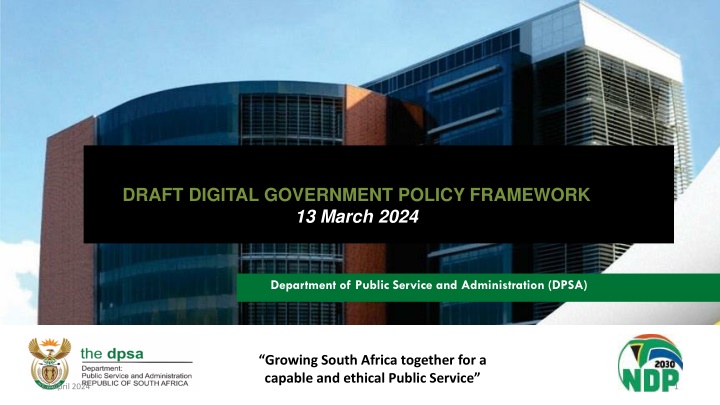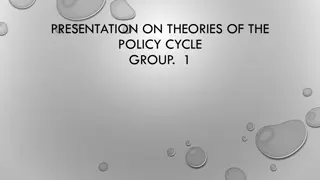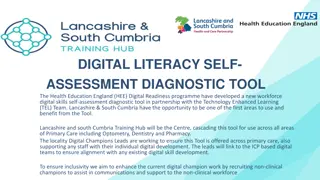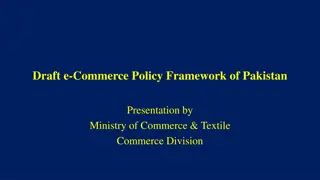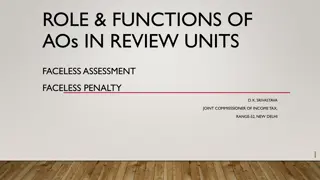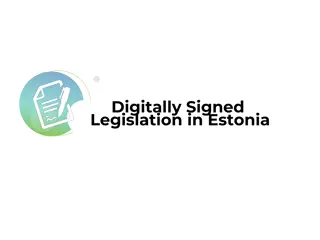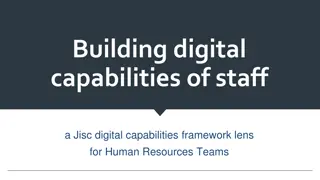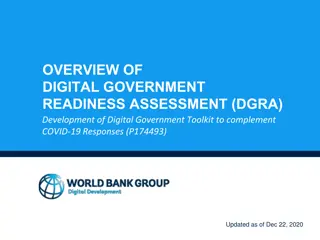Draft Digital Government Policy Framework - Overview and Impact Assessment
The presentation outlines the Draft Digital Government Policy Framework focusing on the purpose, background, problem statement, legislative framework, key policies, digital maturity stages, aim, six pillars, service delivery emphasis, implementation plan, progress updates, and future plans. It addresses challenges in service quality, governance standards, data management, ICT leadership, and more, aiming to enhance government efficiency and citizen trust in South Africa.
Download Presentation

Please find below an Image/Link to download the presentation.
The content on the website is provided AS IS for your information and personal use only. It may not be sold, licensed, or shared on other websites without obtaining consent from the author.If you encounter any issues during the download, it is possible that the publisher has removed the file from their server.
You are allowed to download the files provided on this website for personal or commercial use, subject to the condition that they are used lawfully. All files are the property of their respective owners.
The content on the website is provided AS IS for your information and personal use only. It may not be sold, licensed, or shared on other websites without obtaining consent from the author.
E N D
Presentation Transcript
DRAFT DIGITAL GOVERNMENT POLICY FRAMEWORK 13 March 2024 Department of Public Service and Administration (DPSA) Growing South Africa together for a capable and ethical Public Service 17 April 2024 1
Presentation outline of Digital Government Policy Framework 1. Purpose of the presentation 2. Background 3. Problem Statement 4. Legislative Framework 5. Key digital government policies published recently 6. Definition and Stages of Digital Maturity 7. Aim of the Policy Framework 8. Six Pillars of Digital Government Policy Framework 9. Service Delivery at the centre of DX 10. Proposed Implementation Plan (Key Priorities) 11. Progress made to finalise the Policy Framework 12. Progress made to finalise the Policy Framework 13. Way-forward Growing South Africa together for a capable and ethical Public Service 17 April 2024 2
Purpose of the presentation To brief the Portfolio Committee (on Public Service and Administration) on the draft Digital Government Policy Framework Growing South Africa together for a capable and ethical Public Service 17 April 2024 3
Background In 2017 Cabinet approved the National e-Government Strategy and Roadmap to guide the digital transformation of public service in South Africa. In 2018 MPSA presented the Public Service Digital Transformation Strategy to Cabinet, and Cabinet directed the MPSA develop a joint programme with key Ministries The 1998 Presidential Commission recommended the establishment of SITA, OGCIO, GITO, GITOC. In 2001 the DPSA developed the "Electronic Government - The Digital Future, A Public Service IT Policy Framework . In 2022, the DPSA developed Directive on the use of cloud technologies, information security management, ICT Service Continuity, and Corporate Governance of ICT Policy Framework In 2023, the Draft Policy Framework was reviewed and consulted with the DCDT and inputs were incorporated into the current version of the Draft Policy Framework. In 2020 the DPME & Presidency reviewed the 2017 strategy and recommended its review. In 2024, the President established an Inter-Ministerial Committee on Digital Government Growing South Africa together for a capable and ethical Public Service 17 April 2024 4
Problem Statement The quality of services and the efficiencies of government when delivering services remains unsatisfactory despite the initiatives that were identified and implemented: Lack of a single strategy (DPME reviewed National e-Government Strategy and Roadmap in 2020) Lack of ICT e-Government leadership for government as a whole The lack of adherence to the standards of governance Disjointed design of business processes within and between departments Lack of data management practices Silorised and old Information Systems Lack of Whole-of-Government Enterprise Architecture Universal Service and Access to ICT by government service delivery sites Funding for digital initiatives Lack of digital skills Lack of government trust High cost of ICT goods and services and inefficient implementation thereof Growing South Africa together for a capable and ethical Public Service 17 April 2024 5
Legislative Framework Growing South Africa together for a capable and ethical Public Service 17 April 2024 6
Key digital government policies published recently Growing South Africa together for a capable and ethical Public Service 17 April 2024 7
Definition and Stages of Digital Maturity Digital Government defined as ' the use of digital technologies, as an integrated part of governments' modernisation strategies, to create public value' (OECD,2019) Post Digital Government: Mission & Impact Empathetic Insights Driven Ecosystem Orchestration Digital Government: Focus: Citizen & Value Citizen-Centric Data-Driven & Proactive Collaboration e-Government: Focus: Administration Process Centric Reactive Silos STAGES OF DIGITAL MATURITY Digital Government is an evolution of government services and operations in the context of digital technology from e- Government to digital government, as well as the post-digital government (Stages of Digital Maturity) Growing South Africa together for a capable and ethical Public Service 17 April 2024 8
Aim of the Policy Framework The aim of the Draft Digital Government Policy Framework: To provide a comprehensive and coherent approach to leveraging digital technologies for the provision of public services, improving the efficiency and effectiveness of government operations, and fostering a citizen-centric approach to governance, To establish a digital-first mindset across all government departments and agencies, promote collaboration and coordination among government entities, and ensure that digital initiatives align with the overall strategic objectives of the government, To establish and institutionalize the required governance mechanisms for the digital transformation of the public service, To entrench the roles and responsibilities to improve coordination towards the realization of an effective digital government programme, To identify the required norms and standards that can help or support department in their digital transformation journey, and To give direction to departments on the key focus areas and pertinent matters they must address in order for them, and by extension the entire public service, to transform digitally. This is to ultimately ensure improved service delivery to the citizens. Growing South Africa together for a capable and ethical Public Service 17 April 2024 9
Six Pillars of Digital Government Policy Framework Enhance citizen access to digital services: Develop and implement digital services that are accessible to all citizens, regardless of location or socio-economic status. Improve efficiency and effectiveness operations: Streamline government processes through the use of digital tools and technologies, reducing administrative burden and freeing up resources for other priority areas. Ensure security and privacy of citizen data: Establish comprehensive policies and guidelines for data security and privacy, and ensure compliance with relevant legislation and regulations. Foster innovation and digital skills development: Encourage the adoption of emerging technologies and cultivate a culture of innovation within the public sector. Develop the necessary digital skills among government employees to support the implementation of digital services. Enhance transparency and accountability: Utilize digital tools and technologies to improve transparency in government operations, and facilitate citizen engagement and participation in decision-making processes. of government Source: OECD, 2020 Growing South Africa together for a capable and ethical Public Service 17 April 2024 10
Six Pillars of Digital Government Policy Framework The Digital Government Policy framework is based on the six dimensions of Digital Government as identified by the OECD. These are: Data-driven: This pillar seeks to leverage data to enhance government services and inform decision-making. The principle underlines the importance of fostering a data-driven culture within government by encouraging the utilization of data for evidence-based policy formulation, enhancing service delivery, and promoting transparency and accountability Government as a platform: The pillar advocates for leveraging technology to create a more integrated and efficient government that delivers services and information to citizens, businesses, and other government entities in a more seamless and user- friendly way. Digital by design: This pillar aims to establish clear organisational leadership along with effective co-ordination and enforcement mechanisms. All policy processes must be embedded with digital as a mandatory transformative element. Open by default: The Open by Default principle emphasizes that government data and information should be made available to the public as the default position, without requiring individuals or organizations to make a request for access. Proactiveness: Proactiveness represents the ability of governments and civil servants to anticipate people s needs and respond to them rapidly, so that users do not have to engage with the cumbersome process of data and service delivery User-driven: the importance of designing government services that are tailored to meet the needs and expectations of citizens, businesses, and other users. Growing South Africa together for a capable and ethical Public Service 17 April 2024 11
Service Delivery at the centre of DX The envisaged outcome of developing the policy framework is to improve delivery of services to the citizens and key interventions will include: Design services in collaboration with citizens to ensure their active participation to identify the services they require and a suitable platform for their delivery Integration of platforms to access services by creating catalogue of government services, e-Services portal, one-stop shop centres and super-App Create whole-of-government learning management systems for employees that is accessible to citizens Complement the current imbizos, site visits with technology platforms and thus increase access and coverage of remote areas Growing South Africa together for a capable and ethical Public Service 17 April 2024 12
Proposed Implementation Plan (Key Priorities) Intervention Priority Area Responsibility Leadership and governance Establish structures to support the IMC DCDT, DPSA and Presidency Digital Government Strategy Revise the current National e-Government Strategy and Roadmap to place more emphasis on emerging technologies e.g. Artificial Intelligence Develop a policy and guidelines for data management. DCDT, DPSA and Presidency DPSA, DCDT Data Management Develop policies and guidelines on emerging technologies DCDT and DPSA Emerging technologies Partner with the private sector and academic institutions to implement the National Digital and Future Skills Strategy Develop mechanisms to modernise the transversal pool of systems DCDT, DPSA, NSG, PSETA and Presidency Digital Skills Development SITA Information Systems Establish norms and standards for the use of online platforms to ensure citizen participation to influence the design and delivery of services Implement the Business Process Modernisation Programme Accelerate the implementation of SAConnect for universal access by government and citizens DPSA Modernised access to government services DCDT Improved Connectivity Develop Open Data policy and Portal in line with OGP recommendations DPSA Access to Government Data Growing South Africa together for a capable and ethical Public Service 17 April 2024 13
Progress made to finalise the Policy Framework Consulted the DCDT following approval by the Minister Presented the policy framework to the Ministers of PSA, Finance and Presidency Presented the policy framework to the PSA portfolio committee Consulted stakeholders across government and the private sector. Revised and incorporated the inputs received Growing South Africa together for a capable and ethical Public Service 17 April 2024 14
Way-forward Present the policy framework to the Inter-Ministerial Committee on Digital Government established recently Publish the policy framework for public comment Finalize the policy framework and submit for approval Growing South Africa together for a capable and ethical Public Service 17 April 2024 15
